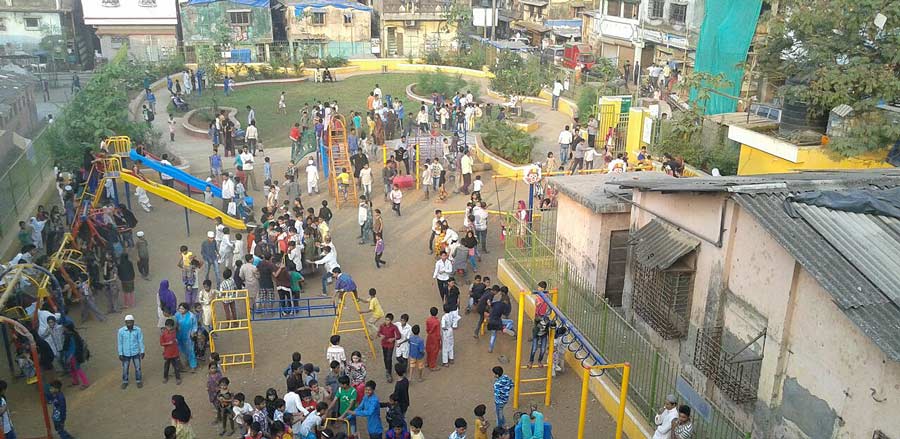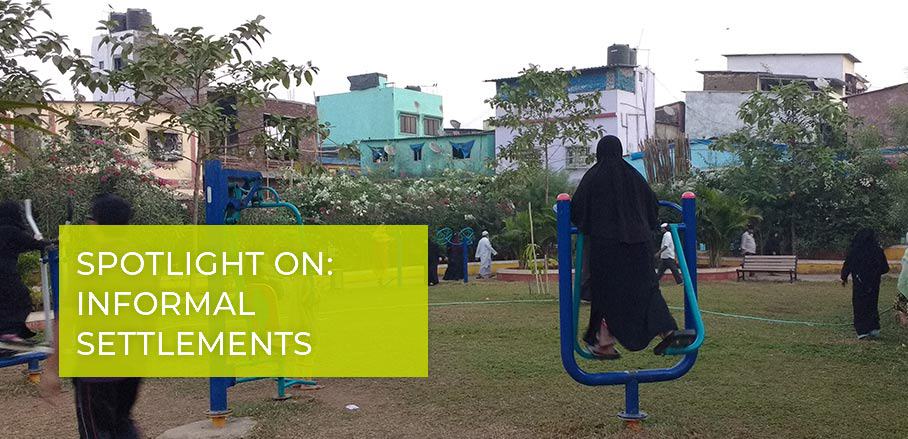Participatory Slum Upgrading in Mumbai
India’s financial centre is one of the densest cities in the world and also home to a number of slums with urgent need for improvements. Trupti Amritwar Vaitla, CEO of the Mumbai Environmental Social Network, highlights a few of their innovative slum upgrading projects that have a participatory element at their core.
A City With A High Price
Mumbai has poor-quality public infrastructure, yet property prices are unaffordable. The result: more than 45 per cent of the population live in slums.
Lack of basic infrastructure and facilities have forced residents to adopt illegal ways to ensure their livelihoods. Additionally, the lack of rule of law encourages them to seek protection and patronage of the local administration and political representatives, who in turn allow illegalities to continue for their own gains. This vicious cycle has taken away the voice and vision of communities living in slums, with which they can advocate for the common good over individual gains.
Public Spaces Are Key
In most slums, the built-up space per capita is low due to the high population density. The number of public spaces is close to zero. Thus, upgrading public infrastructure and developing the scarce public spaces is a top priority to improve social well-being.
With support from UN-Habitat, the Mumbai Environmental Social Network (MESN) has organised several public space projects with the local communities in some of the poorest neighbourhoods in Mumbai. MESN’s aim is to instill a sense of collective responsibility for the positive use and upkeep of public spaces in their neighbourhood.
MESN’s first project was to develop a 1,300 square metre garden plot, the so-called Lotus Garden, for roughly 200,000 residents in the Lotus Nagar slums in the Govandi area. The second project involved improving the public spaces within the Gautam Nagar resettlement colony.

© MESN
The MESN Approach
At the heart of MESN’s strategy is a trust-building process. Once the community realises and trusts that MESN is working on things that their neighbourhood desperately needs, they are more willing to get involved in the development activities.
Cleaning Up Lotus Garden
MESN started to work on a cleaning campaign with the community around Lotus Garden to address one of the neighbourhood’s most urgent issues. Apart from improving local health and hygiene, the objective was also to reclaim filthy public spaces. To this end, MESN helped 2,500 households to form the Advanced Locality Management (ALM) to promote proper waste disposal and collection. Over several months, people representing all spheres of the community came together in focus groups to discuss their different needs and concerns. This helped promote general cleanliness and strengthened their sense of belonging. The improvements helped MESN build a positive relation with the local community, and also inspired other neighbouring localities to consider forming ALMs.
The project encountered hostilities. For example, the local representative instructed the local municipal corporation to refuse the permission for development and started spreading rumours about MESN’s intention of misusing the funds that they had received from UN-Habitat for the development of the public space. These hurdles resulted in MESN stopping the project. However, MESN’s investment in building trust started showing results. The local community came out in support, acquired the “No objection certificate” (NOC) for the development, and, ultimately, persuaded MESN to restart the project.
Sustainable Results
Once the Lotus Garden was ready for use, there was apprehension that it would get vandalised. Fortunately, the participatory efforts had made a lasting impact. Even now, five years later, the garden is well protected and maintained. The trees have grown tall and all the infrastructure is still in place. Locals are proud of their small patch of green, and it has given them a positive sense of identity.
Improving Community Participation With Technology
In the Gautam Nagar project, UN-Habitat encouraged MESN to use the game Minecraft to help the community plan and design a public space on their own. Motivating residents to participate was challenging, but eventually MESN encouraged 40 locals to join.
At first it seemed the project was going to fail, as a lot of the participants did not return after the first session. Fortunately, the children in the group started to understand Minecraft and got their families and friends involved in the process. They felt happy to be part of something meaningful and to create positive surroundings for themselves. On the last day, five groups presented their designs in front of government officials, local leaders, organisations, and other community members. To speak in front of so many people and express their ideas to improve their surroundings was a unique and empowering experience, especially for the women, as perhaps for the first time they felt like their opinion mattered.
Mapping The Upgrades
Each year, Mumbai’s local government allocates a huge amount of their budget for slum improvements. Unfortunately, due to the absence of any inventory and mapping of slum areas, it is very difficult to quantify any improvements. This has resulted in not a single slum being declassified, despite the amount of money being spent on upgrading.
To counteract this, MESN designed a real time mapping software integrated with web-based GIS, with the aim of making the work that goes into slum upgrading more effective and accountable. The mobile application is used to engage local residents to map the condition of existing infrastructures in real time.
MESN carries these mapping works out on behalf of the municipal government but also shares their findings with the local residents. The final action plan provides accurate spatial and quantitative data that identifies which infrastructure requires urgent attention. This information helps residents put pressure on their local councilor or municipal government to undertake urgent improvements, and in turn makes the mapping process more participatory.
- Participatory Slum Upgrading in Mumbai - 23. January 2020
